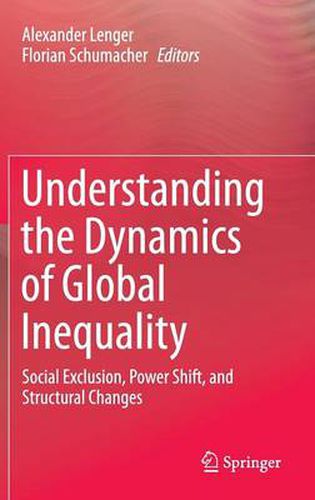Readings Newsletter
Become a Readings Member to make your shopping experience even easier.
Sign in or sign up for free!
You’re not far away from qualifying for FREE standard shipping within Australia
You’ve qualified for FREE standard shipping within Australia
The cart is loading…






This title is printed to order. This book may have been self-published. If so, we cannot guarantee the quality of the content. In the main most books will have gone through the editing process however some may not. We therefore suggest that you be aware of this before ordering this book. If in doubt check either the author or publisher’s details as we are unable to accept any returns unless they are faulty. Please contact us if you have any questions.
Despite the fact that the globalization process tends to reinforce existing inequality structures and generate new areas of inequality on multiple levels, systematic analyses on this very important field remain scarce. Hence, this book approaches the complex question of inequality not only from different regional perspectives, covering Africa, Asia, Europe, Latin and Northern America, but also from different disciplinary perspectives, namely cultural anthropology, economics, ethnology, geography, international relations, sociology, and political sciences.
The contributions are subdivided into three essential fields of research: Part I analyzes the socio-economic dimension of global exclusion, highlighting in particular the impacts of internationalization and globalization processes on national social structures against the background of theoretical concepts of social inequality. Part II addresses the political dimension of global inequalities. Since the decline of the Soviet Union new regional powers like Brazil, China, India and South Africa have emerged, creating power shifts in international relations that are the primary focus of the second part. Lastly, Part III examines the structural and transnational dimension of inequality patterns, which can be concretized in the rise of globalized national elites and the emergence of multinational networks that transcend the geographical and imaginative borders of nation states.
$9.00 standard shipping within Australia
FREE standard shipping within Australia for orders over $100.00
Express & International shipping calculated at checkout
This title is printed to order. This book may have been self-published. If so, we cannot guarantee the quality of the content. In the main most books will have gone through the editing process however some may not. We therefore suggest that you be aware of this before ordering this book. If in doubt check either the author or publisher’s details as we are unable to accept any returns unless they are faulty. Please contact us if you have any questions.
Despite the fact that the globalization process tends to reinforce existing inequality structures and generate new areas of inequality on multiple levels, systematic analyses on this very important field remain scarce. Hence, this book approaches the complex question of inequality not only from different regional perspectives, covering Africa, Asia, Europe, Latin and Northern America, but also from different disciplinary perspectives, namely cultural anthropology, economics, ethnology, geography, international relations, sociology, and political sciences.
The contributions are subdivided into three essential fields of research: Part I analyzes the socio-economic dimension of global exclusion, highlighting in particular the impacts of internationalization and globalization processes on national social structures against the background of theoretical concepts of social inequality. Part II addresses the political dimension of global inequalities. Since the decline of the Soviet Union new regional powers like Brazil, China, India and South Africa have emerged, creating power shifts in international relations that are the primary focus of the second part. Lastly, Part III examines the structural and transnational dimension of inequality patterns, which can be concretized in the rise of globalized national elites and the emergence of multinational networks that transcend the geographical and imaginative borders of nation states.